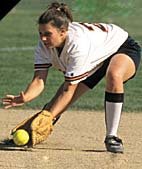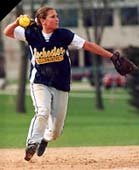
Jamie

Drill
This is an excellent drill to start your defensive practice using every player on the team to warm up fielding & throwing. I usually start this drill with 4 balls allowing for 4 overthrows. We are trying to field the ball correctly. We are also emphasizing accurate throws. If the fourth ball is overthrown the entire team will take a lap around the field (jogging) and the drill will start over.
I've had great success with this drill narrowing the number of balls down to two. Anyway ... on to the drill. Setup a player at first base with a second player as a backup. Setup a catcher at home. All other players are at third base with one player playing third base and everyone else in line outside the foul line.
Coach is at home plate with the 4 balls and a bat. Coach hits grounder to third baseman who fields the ball; makes an accurate throw; follows her throw and becomes backup at first base; player playing first base after catching ball makes accurate throw home to catcher; then follows her throw to become catcher; catcher tosses ball to coach(catcher then goes to end of line at third base) who hits to next player in line at third base.
 After entire team completes fielding & throwing to, from third base; move to ss; then to second base; then back to third base and run bunt defense with a player at second base moving to first base for the catch (on the bunt defense you now have the first base backup playing second base, and first base and third base charge the bunt.
After entire team completes fielding & throwing to, from third base; move to ss; then to second base; then back to third base and run bunt defense with a player at second base moving to first base for the catch (on the bunt defense you now have the first base backup playing second base, and first base and third base charge the bunt.
After the play, the first base comes home to be catcher; second base becomes first base, third base moves to second base and catcher gets in line at third base.

Mechanics Series

Objective
This throwing drill is used for warm ups and is done is a series. It allows the players to focus on the "mechanics" of proper throwing techniques, using certain isolation drills.
Drill
- Indian style: have the players start approximately 10-12 yards from their partners sitting indian style. By throwing in this position, the players isolate the upper body motion, using the glove hand for proper shoulder rotation. To help emphasize proper follow through, the players should follow through with their throwing arm elbow outside the knee, as if picking a blade of grass (this can also be done in the kneeling position with both knees on the ground, bodies square to their partners).
- One Knee: Have the players proceed to the 1-knee position, stride leg in front pointing toward their partners. The players should move back to approximately 15-20 yards. This focuses on upper body mechanics and accuracy. Again, the players should follow through with their throwing elbows outside the knee with bend in the waist.
- Standing: Players put all three together and begin throwing from the standing position. Again, emphasize using the glove hand to point at the target as well as proper follow through (throwing wrist should brush the outside of the knee).
- Crane: Players begin in the "crane" position. That is, with their stride leg raised in the air (knee bent), their glove hand pointing at their target, their throwing hand in the launch position (ball outside ear), players hold in this position for 2-3 seconds before releasing the ball. To ensure proper follow through, the players then take one full step toward their partner after releasing the throw.
This helps the players focus on properly using their glove hand for emphasis on shoulder, hip and knee rotation. What I tell the girls is that (if righty), their left shoulder, hip and knee point at their target and when they are done, their right shoulder, hip and knee should be pointing at their target.
- Quick throw: Players work on framing and quick release. Players catch and throw without hesitation for approximately 1-1.5 minutes consecutively.
- Tags: While partners are working their "Crane" positioning, the receivers set up in the straddle position. When the throw comes in, they perform sweep tags. This allows the receivers to train along with the throwers.
- Throwing for distance: Once the series has gone through, continue to have the players back up until they are able to make accurate, strong throws DIRECTLY to the receiver. No lob throws. This strengthens arms.

Striped Ball Mechanics

Objective
Many coaches overlook a great opportunity to instruct correct throwing mechanics when the players are warming up. What I like to do is to have about 7-8 softballs with a stripe drawn right down the middle and have the players get on one knee and warm up letting the ball roll off the fingertips and imparting the proper "6-12" rotation to the ball. The ball will actually have "riseball" spin on it when done properly.
Drill
This drill is done completely with the wrist and fingers. The proper rotation "6-12" is necessary to make the ball fly straight to the target and to make it fly farther. If a ball thrown from third base to first base has sideways or "curve ball" spin on it, what was a great throw directly to the firstbaseman, will now be way offline and could cause an error.
The ball with the proper "6-12" rotation will fly perfectly straight to the target and with less drop. I usually have my players do this drill for about 5-10 minutes before throwing overhand.

Three Ball Throwing Mechanics

Objective
If a player's throwing mechanics are improper, one characteristic of this is the glove hand flying away from the body and away from the target. This will result in less velocity toward the target and generally a ball that is offline.
Drill
 One drill I use a lot is to place 3 balls into the players' hands (glove hands) and have them go through their throwing motion. If the glove hand is flying out, the player will not be able to hold onto the balls in her glove hand and they will fly out.
One drill I use a lot is to place 3 balls into the players' hands (glove hands) and have them go through their throwing motion. If the glove hand is flying out, the player will not be able to hold onto the balls in her glove hand and they will fly out.
This is instant feedback to the player that a mechanical correction is needed and the coach can correct it immediately. If her mechanics are correct, the balls will be held in the glove hand and no correction is needed.

Throwing For Bucks

Drill
Regardless of the name of this game you won't go broke. At the end of practice is the best time to do this drill. Place a large container on its side (a 30-gallon trash can is perfect but a ball bucket will work) at home plate with the open end facing centerfield. Have fielders line up in centerfield (age of players are a factor in how deep you go to centerfield). Players should be lined up to receive a hit ball.
The first player fields an outfield hit from the coach and attempts to throw the ball on target and one-hop it into the bucket. After her first attempt she goes to the end of the line and next player tries. We offer $1 to each player who is successful within three trys. The $1 incentive has grown with the age of our players now this contest is worth $5 at the 15-16-year-old level.

Throwing Form

Objective
Watching warm ups, throwing warm ups in particular, the main problem I spotted in players trying to make the team was their throwing motion. Granted, some of the players had been taught the correct form for throwing the ball, but a lot had absolutely horrid form. Here are a few drills to fine-tune your throwing form.
Drill
The bring-back of the throwing hand is done in a graceful, arching movement. The hand swings back and up, with the ball facing backward at the top of the arch. This can be practiced by having someone stand about 5 feet directly behind you. Take a ball and from the hand in glove position (as if the ball were just fielded) separate the hands with the ball hand swinging first down, then back and up until your throwing-arm bicep is parallel with the ground and you have a 90-degree angle with your forearm pointing up and the ball facing backward.
Looking at this motion from the third-base side (right-handed thrower) the ball hand starts at 9 o'clock, swings down to 6 o'clock then up to 12 o'clock. If you release the ball at about 3 o'clock (for the drill) and your form is correct, the ball should be easily caught by the person standing behind you. If the ball goes to the left or right of the catcher, you are not using a proper path for your arm.
Practice this drill until you have the proper arm motion, then, instead of releasing the ball, go into your throwing motion, stride with your lead foot and follow through.
If you need additional work on this motion, try the load-and-go drill. Stand with your weight evenly distributed between both feet and in the position of already having taken your stride, with hips facing toward third base (right-handed thrower) transfer your weight to the rear foot and lift the front foot off the ground.
As you come forward with the ball in the throwing motion, transfer your weight back to your lead foot and make a throw.
If you work on this drill, it will improve your accuracy and distance.

3-2-Run

Drill
I got this game from a site on the Internet. If anyone knows whose it is, I will gladly give them credit. It is a game we use almost every week.
Place 3 balls on the ground evenly spaced, about 3/4 of the way from third base to home. The fielding team has a third baseman and a group at second base. Another team is at bat (without bats). When the coach yells, "Go", the batter (runner) runs as fast as she can to first base and on to second.
The fielder at third base runs to the first ball and makes a throw to a teammate at second base, then goes to the second ball and makes a throw to the same fielder at second base and does the same thing with the third ball.
The object of this game is to make 3 good throws from third base (third-base line) to second base before the runner gets to second base. If the runner gets there first, or if the fielder makes a bad throw or bad catch, the batters get 1 point (you can use any value you want). If the fielders get all 3 balls to second base before the runner gets there, no points are awarded.

Hit The Bucket

Drill
To improve throwing accuracy and footwork in the infield, I like to divide my team in two groups. Half are positioned at shortstop and the other half are positioned at second base. We mark off a starting point the girls must stay behind until a ground ball is hit to them by a coach at home plate.
Each group alternates players feilding ground balls and throwing to home plate where two stacked buckets are located. Each time a player hits the top bucket on a bounce 1 point is awarded. Hitting the bucket without a bounce gets 2 points.
My players charge the ball as hard as they can so they can get a shorter throw. First group to 10 points is the winner and usually gets extra hacks during BP.
Endurance Eating: Before, During & After The Event!
Eteamz.com Members,
